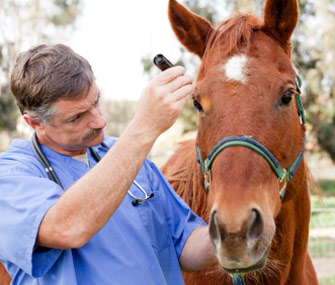Current Federal Law Puts Mobile Veterinary Practices in Danger
Published on March 05, 2013

Decades after the house call faded out of human medicine, traveling to patients is still an essential part of veterinary care. While you may think mobile veterinary practices are important only for people who have large animals, such as horses, veterinarians who offer house calls are, in fact, an essential part of caring for cats and dogs as well.
Unfortunately, U.S. law makes it illegal for veterinarians to transport some of the medications they need in order to provide the best possible care. According to an article in the JAVMA News, under the Controlled Substances Act, passed by Congress in 1970, doctors of all types are required to "have separate registrations for every location where they store, distribute or dispense controlled substances." The strictest reading of this law means that veterinarians are not allowed to transport certain drugs to remote locations, although the U.S. Drug Enforcement Administration has essentially looked the other way for years.
That may be coming to an end, though. Some mobile veterinarians in Northern California were questioned last spring in what appeared to be a routine check for legal compliance by the DEA and were warned that their practices were in violation of the law. As a result, the push is on to change the law so veterinarians with mobile practices can continue their important work without a legal cloud over their heads.
Veterinarians Breaking the Law?
While the idea of a veterinarian traveling to an animal who is too big to bring to the office (cows and horses, for example) is not a new one, mobile veterinary care is not limited to larger species. The need for home hospice care and at-home euthanasia for pets has grown in recent years. Mobile veterinarians also provide essential basic care for pets whose owners have difficulty getting them to a clinic or hospital and for pets who are too stressed by travel to get the wellness care they need.
The Controlled Substances Act limits the medical supplies mobile vets can carry with them to these appointments, says Dr. Ashley Morgan, assistant director for governmental relations for the American Veterinary Medical Association. “It doesn't matter whether you're providing care in a home, in a barn or alongside the highway, you are not allowed, according to the DEA, to transport controlled substances from the location that you put on your registration form,” Dr. Morgan explains. “There is no way for anyone — whether it is for companion animals, for horses, for cows, for wildlife — to transport controlled substances [without breaking the law]. The pain management that you see with the hospice care, the in-home euthanasia, there is no way to do any of that legally according to the DEA.”
Veterinarians have been more than happy to do our part to fight the toll drug abuse and addiction take on our society. We may grumble now and then at the extra cost, time and security required as part of our responsibilities when it comes to medications covered under the Controlled Substances Act, but we accept that it's necessary in order to provide our patients with these medications. These drugs need to be available in the field, both to relieve animal suffering and to protect the veterinarian and the owner, either of whom can be harmed when an animal who needs it isn't given proper sedation prior to a necessary medical procedure.
“I think we feel we're in a bit of a unique situation because there are many instances where our patients cannot get to a brick and mortar facility,” says Dr. Morgan, who worked as an equine veterinarian before taking the position at the AVMA.
Congress Must Make a Change
The DEA has long seemed to recognize — unofficially, at least — the special needs of the veterinary profession when it comes to moving medications. Dr. Morgan says the DEA is sympathetic to the veterinary profession’s problem with the law as it stands but that the agency believes any exemption must be made by Congress. In other words, the law needs to change.
“We are hoping to introduce legislation that would allow veterinarians in the course of veterinary practice to be able to transport controlled substances for use in patients,” Dr. Morgan says. “It’s not about veterinarians trying to distribute or dispense controlled substances inappropriately, but we do need to be able to transport these substances legally.”
Dr. Morgan says other animal-related groups are also on board, especially since the law puts mobile spay-neuter clinics, which are essential in preventing pet overpopulation, at risk. If the DEA opts for strict enforcement of the Controlled Substances Act as it is currently written, veterinarians will no longer be able to transport the sedatives and pain killers necessary to conduct mobile spay-neuter clinics, which rely on controlled medications that reduce the pain of these surgical procedures.
In this discussion, as in so many conversations about our pets' health, common sense needs to prevail. As a veterinarian, I have long been in support of my colleagues who provide these essential mobile services. And everyone who loves and cares for animals needs to support them as well. We need home-care veterinarians, large-animal veterinarians and spay-neuter outreach, and if we don't speak up in support, these services — and the dedicated doctors who provide them — will remain at risk.
That's just not acceptable. Veterinarians must be allowed to provide the best care possible for the animals who need us, no matter where they are, and they should be able to do it in a way that complies with the laws of our nation.

